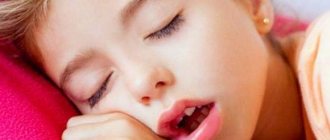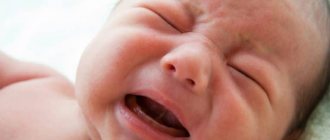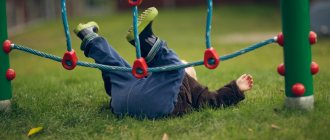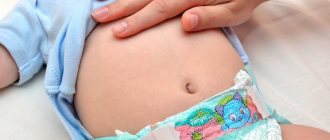Causes of head shaking
There are many completely harmless reasons why a newborn may shake his head while feeding. Quite often, the baby enjoys breastfeeding. According to research, it has been proven that if the balance center of the patient's brain is overstimulated, then the child gets pleasure from shaking his head. In some cases, when performing this action, the child laughs. This is normal, so parents should not worry.
If a newborn has headaches, the child begins to shake his head to eliminate them. At the same time, the child becomes overly capricious. Only a competent doctor can tell you why the baby shakes his head.
The reasons for this condition may be as follows:
- colic in the abdomen;
- teething;
- otitis.
By shaking the head in these pathological conditions, the baby tries to distract himself from the pain. Physiology can tell you why the baby shakes its head. After birth, the newborn experiences strengthening of the neck muscles for several months.
Sometimes head shaking is observed during eating. That is why it is necessary to feed the baby so that its head is fixed in the mother’s hands. After the baby begins to hold his head confidently, mothers should not hold it during feeding.
If a child frequently shakes his head, especially before going to bed, this may indicate the development of rickets. During this period, the baby experiences general weakness and twisted limbs. The child cannot hold his head up until 4 months. When this pathology appears, the baby’s sleep is disturbed and the child becomes whiny.
Quite often, a symptom of pathology is loss of appetite. If signs of this disease appear, the baby should be seen immediately by a doctor. Only a specialist can correctly diagnose and prescribe rational treatment. Otherwise, it is possible to develop flat feet, scoliosis, and protrusion of the chest forward.
Occasionally, infants experience this condition due to curiosity. Infants may experience this phenomenon if the back of the head sweats. The reason for this is improper temperature control in the room and excessive wrapping of the baby. When disturbing dreams appear, the baby may experience head shaking.
There are many reasons for the development of pathology. Some of them may be completely harmless or indicate the development of serious illnesses.
The child shakes, twists and shakes his head from side to side: Komarovsky about the causes of the problem, advice to mothers
Shaking the baby's head from side to side often causes concern for parents.
They see this as a manifestation of a possible neurological disease and, trying to confirm or refute their suspicions, take the baby for a consultation with a doctor. On the one hand, this position is correct, because serious illnesses begin with harmless symptoms. However, often the cause of strange behavior is most often physiological aspects that do not pose a danger.
Why does my baby shake or shake his head? Which doctor should I see and is it necessary? In what cases is emergency assistance required?
Why does a small child shake and turn his head from side to side?
Experts note this phenomenon in children aged 2 months to 3 years. There are several reasons why young children shake their heads. Among them there are quite harmless ones that are easy to eliminate.
In other cases, the phenomenon indicates the presence of disorders of the nervous system. Diseases are accompanied by additional symptoms, so the doctor analyzes the child’s behavior and overall well-being.
Head shaking can occur when the baby is teething, colic and headaches bother him. Symptoms of teething (6-8 months) and intestinal colic (mostly before 3 months of life) disappear with age. The sources of headaches can be different; in this case, examination and consultation with a pediatrician is necessary.
Common “harmless” reasons
Little children love to indulge and play. This is precisely the goal they pursue, shaking their heads from side to side. Many people laugh fervently at this.
In some cases, the child wants to attract the attention of the parents. Mom and dad should evaluate their behavior and analyze whether they are communicating enough with the child. Don't think that the baby is just being capricious. Lack of attention and affection negatively affects the health and development of the child.
Sometimes head shaking is due to the fact that the baby cannot calm down. Rhythmic rocking relaxes and helps you fall asleep. There is no need to leave the child alone in the crib; you need to take him in your arms or in a sling, rock him and sing a lullaby. A warm bath and reading fairy tales can also soothe your baby before bedtime. Gradually the habit of shaking your head will pass.
Neurological diseases
If the above steps do not give the desired result, you should consult a pediatrician or neurologist. Particular attention should be paid to shaking your head immediately before going to bed. It may indicate the following diseases:
- Epilepsy. The child freezes for a few seconds and stops responding to external stimuli. More severe forms are characterized by seizures and loss of consciousness.
- Autism. Autistic children are terrified of being left alone and require the constant presence of their mother nearby. This disease is quite common, but children are not always given an accurate diagnosis. With proper upbringing, children grow up to be full-fledged individuals, achieve success in various fields, but at the same time have their own mental characteristics.
- Krabbe disease. This is a hereditary disease, one of the symptoms of which is head shaking. Sick children experience increased body temperature, increased excitability, and developmental delays compared to their peers. The prognosis for them is unfavorable, it is almost impossible to cure the disease, you can only reduce the severity of the symptoms.
- Opticomyelitis. An autoimmune disease that affects the spinal cord and optic nerve. Characteristic symptoms are dizziness, fever, blurred vision and even blindness. In most cases it leads to death.
Experts are confident that signs that appear at 1, 3, 9 months and 1 year are considered indicative. It is at this time that neurological disorders most often manifest themselves.
The baby has rickets
A child with rickets feels constant discomfort in the neck area, and therefore begins to intensively turn his head. Other symptoms of rickets:
- tearfulness;
- restless sleep;
- increased sweating;
- low weight.
Experts believe that the main cause of the disease is a lack of vitamin D and insufficient exposure of the baby to the sun. Early detection of rickets will prevent possible complications. Pediatrician E.O. Komarovsky is confident that breastfeeding completely prevents the occurrence of this disease.
How to help a baby?
You can help a baby who often turns his head only after identifying the true cause of the anxiety. If he does not have a fever, unreasonable crying and loss of consciousness, you can try to independently determine the source of anxiety, for this you need:
- Touch the baby's head; he may be sweating and hot. If this is the case, you should undress the baby and continue to prevent overheating.
- Evaluate the comfort of the pillow for sleeping. For infants you need to buy only special orthopedic models.
- Try to distract the baby's attention to something interesting. If he calmly switches to other items, then it was a game.
- Analyze the baby's past day. Were there any strong emotional outbursts? Maybe the child was scared of something or was too happy? You need to try to protect the child from factors that excite his consciousness, in which case the head shaking will go away.
- Measure body temperature and observe the baby's behavior.
If head shaking cannot be eliminated, you should consult a specialist. After diagnosis, the doctor will prescribe the necessary treatment.
In what cases should you immediately consult a doctor?
In most cases, the phenomenon goes away without medical intervention. Experts consider head shaking to be a normal age-related characteristic of children under 3 years of age.
You should immediately consult a doctor if:
- head shaking occurs frequently over a long period of time;
- The baby began to eat poorly, does not breastfeed, and sleeps poorly.
An ambulance should be called if the following signs appear in the baby while shaking his head:
- vomiting, diarrhea;
- loss of consciousness;
- heat;
- heartbreaking crying.
Is it possible to prevent such situations and how?
If the underlying problem is physiological or psychological, parents can prevent its occurrence. To do this you need:
- maintain child body hygiene;
- dress the baby according to the weather;
- give the baby enough attention and play with him;
- inspect the crib for foreign objects that may interfere with sleep;
- hang special toys on the sides of the child’s bed that will occupy the fidget’s attention while the mother is away;
- Visit your pediatrician on time.
Source: https://www.deti34.ru/simptomy/golova-sheya/komarovskij-rebenok-motaet-golovoj.html
Neurological diseases
Quite often, a child shakes his head in his sleep due to neurological diseases. In most cases, this phenomenon appears against the background of:
- hydrocephalus;
- epilepsy;
- autism.
In the evening, head shaking can occur after a strong emotional outburst. During the head shaking period, the child screams or cries, and after the attack ends, he exhales. After this, breathing may stop for a certain time.
This phenomenon can be observed with reflex tetraparesis, which is accompanied by tilting the head to one side. Since the child has muscle hypertonicity and pathological reflexes, the child cannot hold his head level for a long time. Because of this, the child begins to shake his head even in a lying position.
If the symptom is observed when falling asleep, then this indicates the development of Krabbe disease. In this case, the child experiences poor weight gain, seizures and allergic reactions to milk. Quite often the disease is accompanied by vomiting and hyperpyrexia. The newborn becomes excessively whiny.
Opticomyelitis is often accompanied by this symptom. During the period of falling asleep, the child experiences dizziness as this pathological process develops. Damage to the distal parts of the hands and feet may occur. The disease is accompanied by optic neuritis. The newborn has frequent headaches, so the head shakes. In some cases, the performance of the pelvic organs is impaired.
If a child suffers from epilepsy, then during the period of falling asleep the limbs may twitch and the head may periodically shake . During sleep, these signs may intensify, causing the baby to start crying. But the baby quickly calms down on his own. The frequency of attacks and the intensity of headaches are directly affected by the severity of the disease.
The causes of the symptom are not only varied, but also quite dangerous. Therefore, parents should closely monitor the behavior of the newborn.
Nervous tics and obsessive movement neurosis in a child: causes of occurrence, what parents should do
Today, nervous tics and obsessive movements (blinking, smacking, coughing, etc.) are considered to be quite common conditions in children.
Often parents do not immediately pay attention to this or do not consider it a serious violation, thinking that soon everything will go away on its own - this is a temporary phenomenon and the child does not need treatment.
Indeed, at first the baby is practically no different from his peers, and frequent blinking, twitching, coughing or swallowing does not bother others, but over time the signs appear more often and more noticeably.
Then the parents turn to a specialist, but the otolaryngologist or ophthalmologist does not find any serious pathologies.
And yet, this is a serious disease that needs to be diagnosed and corrected in a timely manner, because quite often a nervous tic is not only a sign of neurosis, but also a symptom of serious diseases of other organs and systems.
What is a nervous tic
Nervous tics occur due to increased stimulation of certain areas of the brain.
This is a reflex lightning-fast contraction of muscles, most often the face and limbs, that occur spontaneously and are uncontrollable.
In most cases, its appearance is due to dysfunction of the subcortical nuclei, which regulate:
- muscle tone;
- pose;
- facial expressions;
- global motor acts.
The appearance of these movements in a child (often obsessive states) is associated with the need to relieve overexcitation.
Nervous discharge occurs through these actions:
- blinking, winking;
- twitching of lips or eyes;
- smacking;
- nail biting, lip biting, finger sucking;
- nodding head;
- coughing;
- frequent wiping or sniffing in the absence of a runny nose;
- snapping fingers;
- grinding of teeth, and not only at night;
- the child blows on the palm of his hand;
- monotonous rocking or frequent flapping of limbs;
- twitching of the genitals (in boys);
- twirling hair on a finger;
- monotonous pulling or combing of hair.
Features of obsessive movement neurosis in children
But besides this, there is another nature of the occurrence of obsessive movements - obsessive-compulsive disorder.
This condition was first described by the French psychiatrist Esquirol; he called this pathology “the disease of doubt.”
Obsessive movement neurosis is associated with a child's obsession with a certain idea or state. In order to prevent this condition and alleviate his situation, the child resorts to certain ritual actions - movements of a symbolic nature (compulsions) repeated over and over again.
Therefore, the neurosis of repetitive movements can be conveyed through the formula: obsessive state - anxiety - repetitive rituals.
Obsessive movement neurosis in children is manifested by motor obsessions combined with fears.
Causes of nervous tics
Previously, it was believed that nervous tics arise during age-related crises (new stages of independence), which are observed at 3-4 years and 7-8 years.
It is at this time that children first encounter developmental crises:
- new skills are acquired;
- the child's behavior changes;
- personal characteristics are being formed.
The cause of this condition is, on the one hand, instability of work, immaturity or slight damage to the nervous system as a result of:
- Chronic intrauterine hypoxia:
- significant fetoplacental insufficiency;
- maternal diseases during pregnancy (blood diseases, cardiovascular pathology, diabetes mellitus);
- influence of other factors.
- Intrauterine infections:
- toxoplasmosis;
- cytomegalovirus;
- rubella;
- hepatitis;
- chlamydia;
- herpetic infection.
- Acute hypoxia during childbirth:
- premature placental abruption;
- asphyxia and fetal distress during childbirth.
- Birth injuries.
- Taking certain groups of medications by the mother during pregnancy.
- Prescribing medications for a newborn after birth.
- Bilirubin encephalopathy as a result of prolonged jaundice.
But now experts cannot clearly define the boundaries of age-related crises - in modern society, crises of independence occur earlier and it is impossible to clarify the scope of the occurrence of tics.
Today, it is difficult to clearly determine the specific events that caused the appearance of tic.
In most cases, this pathology is usually provoked by a complex of reasons, which include:
- hereditary predisposition;
- parental behavior;
- acute stress.
The combination of these factors most often leads to the formation of constant obsessive movements (tics).
Tics occur more often in boys, and the pain is much more severe than in girls. Moreover, pathological manifestations in children occur at an earlier age than in parents or other relatives.
An unfavorable balance of communications in the family (speech and non-speech) - both shouting and tugging, and an atmosphere of permissiveness contributes to the emergence of anomalies of behavior and character, and often lead to inhibition of the free physiological activity of the baby or infantilism.
Constant quarrels and a tense psycho-emotional situation are also one of the factors in the formation of a nervous tic.
Lack of attention or increased control, demandingness (overprotection) or uncompromisingness of parents often leads to the onset of the disease.
In addition, the cause of tics can be regular long-term spending of time in front of a TV screen or at a computer - this disrupts the alpha rhythm in the brain, which is responsible for the calm and tranquility of the baby.
As well as low physical activity of the child combined with an excess of intellectual stress. Acute stress is considered the main provoking factor:
- acute or chronic traumatic situation that the child cannot cope with on his own;
- unexpected joy or pleasant surprise in an excitable or emotionally unstable child;
- negative atmosphere in an organized team (in kindergarten or school);
- constant overwork;
- A lot of information;
- constant noise or other irritants;
- psychological trauma in a child;
- too high demands on the child
- constant quarrels between parents, divorce;
- frequent somatic diseases.
- long-term ENT diseases (adenoid vegetations, chronic tonsillitis, labyrinthitis, sinusitis).
How do nervous tics occur? Obsessive movement syndrome
When a complex of negative influences begins to affect a child’s body - the baby is in a state of constant stress and has internal anxiety - this is the initial stage of the onset of pathology.
Anxiety is considered a protective mechanism of the brain to prepare in advance for the onset of a dangerous event and speed up reflex activity.
Therefore, during this period, the baby’s brain is in a state of constant anxiety and anticipation of danger. At the same time, the ability to voluntarily suppress the excessive activity of brain cells is gradually lost.
Types of tics in obsessive movement neurosis
Obsessive movement syndrome in children can manifest itself in a wide variety of forms.
The most common symptoms are grimacing and obsessive tics.
These movements are involuntary and unconscious and intensify with excitement or tension.
Among children, the predominance of this syndrome is noted in boys.
Based on the type of manifestation, the following types of nervous tics are distinguished:
Motor tics:
- facial expressions;
- tics of the limbs (twitching, clapping, stamping);
- tics in other muscle groups.
Vocal or vocal tics:
- coughing, snoring, grunting;
- pronunciation of individual sounds, words or phrases.
Rituals.
Generalized or complex tics –
- movements occur simultaneously in different muscle groups;
several types of tics in one child.
It must be remembered that tics cannot occur in an infant - any obsessive movements at this age are associated with organic pathology of the nervous system and require immediate diagnosis and treatment.
Parents should know that
the appearance of various obsessive movements in a child is associated with the need to attract the attention of adults, activating such types of communication as gestures and facial expressions. This baby requires constant attention from the parents.
These gestures and movements, having arisen once, can gradually disappear on their own if the child finds support from loved ones.
But in its absence, the body’s adaptation systems to stress are gradually depleted, and these movements become fixed in the form of a pathological habit, which over time transforms into tics, and later into obsessive movement neurosis.
Recourse
If the child has no other symptoms when shaking his head, then parents have no reason to worry. In some cases, the cause of pathology is a surge of emotions that occurs against the background of stressful situations. In this case, you need to try to calm the baby. If the actions of the parents do not bring the desired result, then you need to seek help from a doctor.
During the period of involuntary head shaking, head injury may occur. Parents need to take this fact into account and prevent it. If the newborn shakes his head and other symptoms are observed, then the child must be shown to the pediatrician. Only a specialist can correctly diagnose a baby and, if necessary, prescribe rational treatment.
A newborn baby's head shaking can have completely harmless causes. If this occurs infrequently and is characterized by the absence of other symptoms, then parents should not worry. Otherwise, the child needs to be shown to a specialist who, after examination, will be able to determine the pathology.











